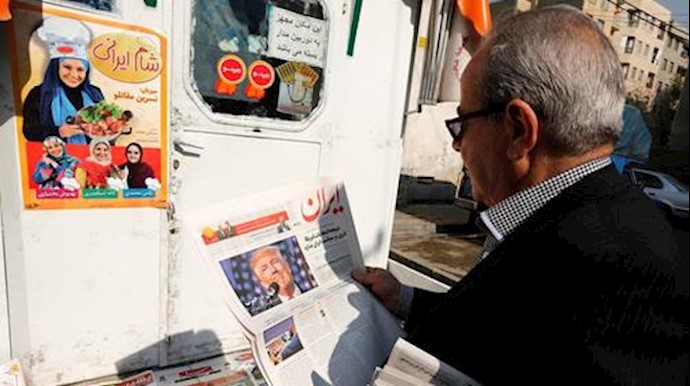Since the victory of President elect, Donald Trump in the presidential elections last week, the mullahs’ regime, from top to the bottom, have reacted with fears and panic. Some have even called the future Trump cabinet, “the Cabinet of horror.”
The Al Arabiya English on Saturday, 19 November 2016 published an article by Mosa Zahed titled:
End of a golden era for the Islamic Republic of Iran
The article says: The Republican victory in the US election has hit Tehran with a bombshell, leaving the ayatollahs dazed regarding the future of the Iran nuclear deal as President-elect Donald Trump vowed during his campaign to revoke the Joint Comprehensive Plan of Action (JCPA) that was struck in July 2015 between the P5+1 and the Islamic Republic.
Iran’s President Hassan Rowhani sought to reassure his cabinet members subsequent to the election results by asserting that the future US administration could not carry out its promise, emphasizing that “Iran’s understanding in the nuclear deal was that the accord was not concluded with one country or government but was approved by a resolution of the UN Security Council and there is no possibility that it can be changed by a single government.”
Rowhani’s elucidation was soon dashed by US State Department’s Mark Toner who in response to the Iranian president stated that the deal could be annulled by a US administration, describing it as an agreement “that any party can walk away from.”
Posturing
The outcome of the election has laid bare the concerns of Iran’s hardliners and their desire for the JCPA to remain intact. This is in sharp contrast to their previous posturing, portraying themselves as being reluctant in dealing with the ‘Great Satan’ due to their ‘revolutionary’ principles and branding the nuclear talks an initiative that was led by the so-called moderate faction within the theocracy.
The clerical regime has utilized various occasions and platforms in order to voice its discontent with the potential Iran policy under a Trump administration that will enjoy Republican majorities in both houses of Congress.
Tehran’s Friday prayer leader Ahmad Khatami used the event last week to issue threats against the US president-elect by uttering that Trump should know better than to play with “the tail of the lion.”
Iranian Defense Minister Hossein Deghan warned the US recently that “Any delay, violation or return from the agreed path will entail high costs for them [the Americans] and they will be the main loser of any of their ignorant and proud measures.”
Alteration in status quo
Beneath the veneer of these idle threats and warnings by Tehran hides a deep apprehension of not merely the JCPA’s fate, but a general alteration in the regional status quo that may well turn against the ayatollahs once the new US administration assumes office and starts implementing its foreign policy. This will inevitably overturn considerable regional foreign policy achievements of Tehran that were made possible due to the favorable Iran strategy espoused by the Barack Obama administration throughout its tenure.
Obama’s main argument in July 2015 in support of the Iran nuclear deal underscored that it “will make America and the world safer and more secure.” A glance at the current state of affairs in the Middle East undeniably illustrates that the world is anything but on course for safety and security and that Tehran has an active part in it.
Exporting the revolution
The ayatollahs have effectively exported Khomeini’s brand of Islamic Revolution to Iraq and have throughout the years, particularly after ISIS’ lightning advance across the country in June 2014, politically and militarily reinforced their authority through the Islamic Revolutionary Guard Corps’ extraterritorial branch and Iraqi Shia militias who propagate Khomeinism and answer directly to Iran.
In the Syrian conflict, Tehran has intensified its substantial political, financial and military involvement in order to prevent the fall of Bashar al-Assad and his regime, while in Yemen the Houthis continue to be trained and equipped by Iran and its terrorist proxies in order to further destabilize the region.
As the ayatollahs are poised to dominate the Middle East, President Barack Obama has shown to be indifferent to this reality as he has failed to formulate an adequate strategy in foiling Iran’s regional expansionism and has instead advised US’ traditional allies to share the neighborhood with Tehran. This indicates that bolstering Iran’s position in the region has been an integral part of the Obama administration’s foreign policy.
However, as Obama’s term is coming to an end and a new US administration is set to be installed, it almost certainly means the end of the golden era for the Islamic Republic of Iran.
Mosa Zahed is the founding director of the London-based Middle East Forum for Development. He operates as a foreign policy and security adviser to parliamentarians of EU member states and has spoken at many parliamentary committee meetings in the United Kingdom and the Netherlands on human rights violations.








